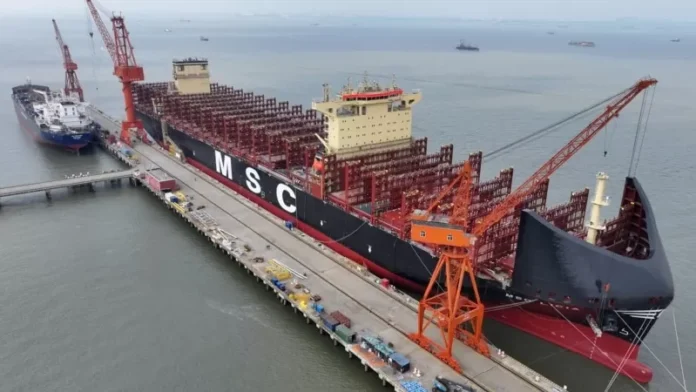The Trump administration has recently proposed a new policy that would impose punitive fees on international shipping, specifically targeting vessels owned by Chinese companies or manufactured in Chinese shipyards. This move has the potential to significantly alter the economics of global trade, and has sparked a heated debate among experts and industry leaders.
Under the new policy, Chinese-owned cargo ships and third-country flagged vessels built in China would be charged $1 million or more per port-of-call in the United States. This could have a major impact on large container ships that often make multiple stops when delivering goods to the U.S., as they would now face new fees at each port.
The proposal, published by the Office of the U.S. Trade Representative (USTR), is tied to an investigation into allegations by several U.S. labor unions that China has unfairly distorted the international shipbuilding industry. The investigation, conducted under Section 301 of the Trade Act of 1974, found that the Chinese government has pursued a policy of subsidizing its domestic shipbuilding industry with the aim of dominating the global market.
Over the past 25 years, China’s share of the global shipbuilding industry has skyrocketed, from 5% in 1999 to over 50% in 2023. This has raised concerns about the impact on U.S. commerce, with the USTR stating that Chinese policy has burdened and restricted American businesses, created economic security risks, and undermined supply chain resilience.
The results of the investigation, which began during President Joe Biden’s administration, were announced last month. The proposal is now open for public comment until March 24, after which the administration will decide whether or not to implement it.
Unsurprisingly, the Chinese government has strongly criticized this move by the U.S. In a statement, Chinese Foreign Ministry spokesperson Lin Jian accused the U.S. of abusing Section 301 investigations and violating WTO rules. He called on the U.S. to respect facts and multilateral rules and to immediately stop its “wrongdoings.”
The China Association of the National Shipbuilding Industry (CANSI) and China Shipowner Association have also condemned the USTR investigation, calling it full of lies and distortion of facts. They argue that China’s shipbuilding industry has strictly followed international trading rules and is the result of collaboration with global partners, technological innovation, and hard work.
The USTR proposal contains several complex elements that make it unclear how any new regime of port fees would be administered. For example, each ship owned by a Chinese entity would be charged a $1 million fee upon entering a U.S. port, but there is also a provision for a fee of $1,000 per ton of capacity, which could add up to significantly more for large ships carrying thousands of tons of cargo.
Furthermore, Chinese-built ships operated by non-Chinese shipowners would be subject to a $1.5 million fee, which could be adjusted based on the percentage of Chinese-built ships in their fleet. This would apply even if the ship’s cargo was not manufactured in China. Additionally, ships owned by companies with existing orders for new ships from Chinese shipbuilders could face an additional $1 million fee per port visit. However, the rule also provides for refunds of a similar amount each time a shipping company sends a U.S.-built cargo ship into a U.S. port.
Many experts and industry leaders have raised concerns about the economic justifications for this proposal. Mary Lovely, a senior fellow with the Peterson Institute for International Economics, stated that it is difficult to find any economic benefits for American businesses or consumers. She also predicted that this move could lead to more convoluted shipping routes and higher prices for U.S. businesses and consumers.
Joe Kramek, president and CEO of the World Shipping Council, echoed these concerns, stating that the proposed fees would cause broad economic harm across all sectors of the U.S. supply chain. He also warned that the fees would result in fewer U.S. port calls, higher prices for consumers, and severe impacts for exporters, particularly American farmers.
Moreover, this policy is unlikely to benefit U.S. shipbuilders as intended. According to Marc Levinson, a Washington-based economist and historian, U.S. commercial shipbuilders are not competitive on the international market for commercial oceangoing vessels. He believes that the winners of this policy would be countries like Japan, Korea, and the Philippines, while U.S. consumers would bear the brunt of higher prices for imported

